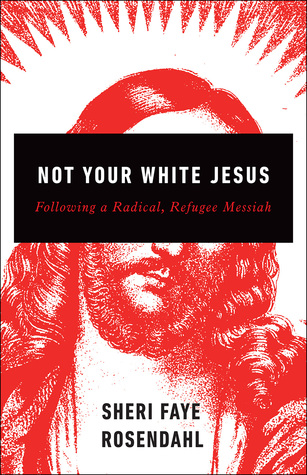 Not Your White Jesus by Sheri Faye Rosendahl
Not Your White Jesus by Sheri Faye Rosendahl Published by Westminster John Knox Press on October 9, 2018
Source: NetGalley
Genres: Religion & Spirituality
Pages: 176
Format: eARC
Purchase at Bookshop.org
Add on Goodreads

Jesus is not white. Jesus is not American. Jesus does not want to make America great. While many of us grew up looking at gleaming portraits of Jesus with blond, flowing hair and hearing sermons reaffirming that we have the answers to save a fallen world, the real Jesus--a Middle Eastern Jew preaching radical, humble, self-emptying love--calls us to a different life.
As we see oppression and hate run rampant in our nation, it's as if Christianity has lost sight of the red letters altogether. Sheri Faye Rosendahl takes a look at important social issues in our society, the responses of American Christians, and the true ways behind the red letters. Not Your White Jesus addresses the need to reexamine the true ways of Jesus that we find clearly in the red letters, enabling readers to discover what it truly means to follow the ways of Jesus in contrast to following the ways of the American Christian elite.
Not Your White Jesus is a difficult book to write about. Rosendahl makes some good points about Jesus and how he dealt with people throughout the New Testament. However, her tone and slang are totally off-putting.
I definitely like Rosendahl’s main message. When asked what the greatest of the commandments was, Jesus responded, “The first in importance is, ‘Listen, Israel: The Lord your God is one; so love the Lord God with all your passion and prayer and intelligence and energy.’ And here is the second: ‘Love others as well as you love yourself.’” (from The Message).
Jesus loved people and we should too, especially the marginalized in society, the tax collectors, the prostitutes, the poor, the prisoners, and even people of other religions. His harshest words were always for the “religious” men of the time who were more interested in rules and appearances, not in loving their neighbors. Maybe we should be worried about loving people around the world and teaching them to love others, not about converting them. She does definitely prioritize love over other New Testament truths, but I’m not sure that right now that’s wrong. We could use more love, less hate, more caring, less violence.
She takes her basic argument, that love is what matters, and looks at a few of the current topics of today, like war, misogyny, consumerism, refugees and immigration. She uses scripture to illustrate her points and I agree with her a lot of the time.
I could complain that she deals in stereotypes a lot – that American Christians are rabidly pro-life, but are looking down our noses at pregnant teenagers or young single mothers, that we are all gun rights fanatics and are supporting bans on Muslims and building a wall. We all aren’t, I’m not. I do think she represents a large portion of the population who see Christians in that light. We can only change that perception by making sure the world see how caring, loving, accepting, non-violent Christians can be.
I have a couple of problems with the Not Your White Jesus. First, the author’s tone is antagonistic and will alienate the very Christians she want to impact. People don’t change their minds by being yelled at. Second, she uses so much slang and text-speak. I feel like she’s trying too hard to be current and relevant and in three years, her book is going to sound silly. Calling Jesus the J-man, using words like “rando” and “mic drop” just don’t do justice to her message. The title and blurb will make people pick up the book, but her writing might drive them away.

I think I’ll pass on this book.
Yeah, it’s definitely not for everyone. I’m not sure if there’s anyone I would actually recommend read it.
Sounds like a good premise – too bad it’s not written better.
Exactly. I felt like the message was good, but the style just didn’t work for me.
A shame you found the author’s tone and use of slang so off-putting … I’m pretty sure it would have put me right of as well which is a shame as it sounds like they had a lot of interesting things to say.
Exactly, which leaves me wondering who she was writing for. I can stand being told I’m wrong, and even the attitude I could have overlooked, but a lot of the phrases just made it seem like she was trying to hard.